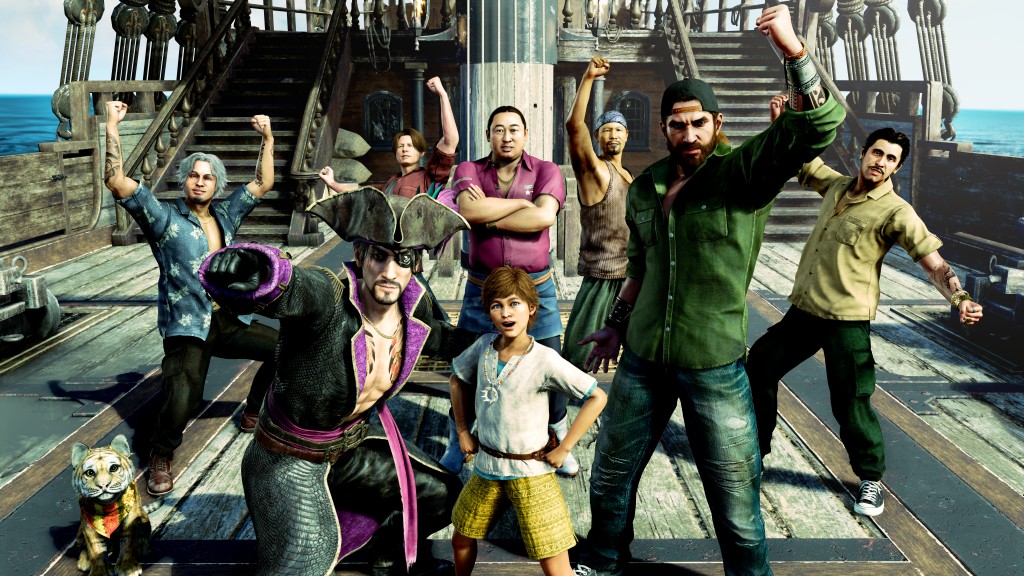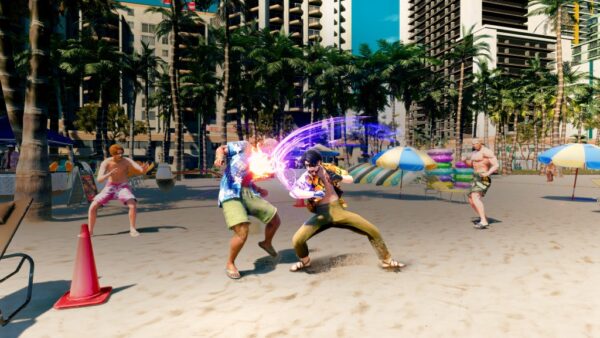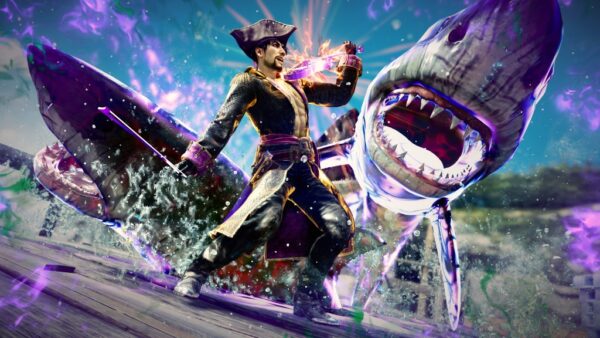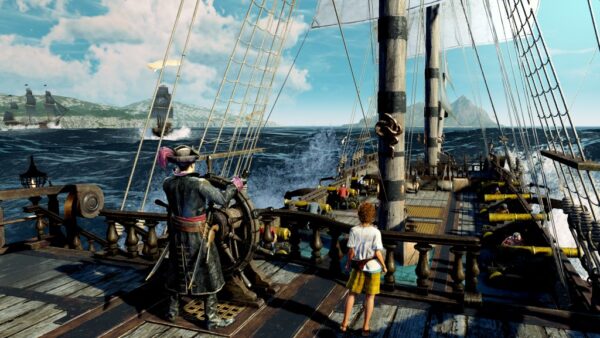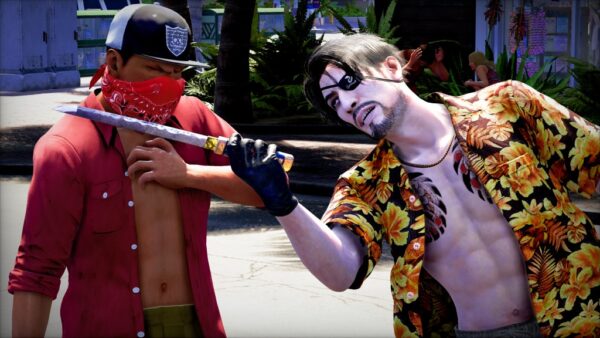Also On: PS5, PC, Xbox One, Xbox Series X
Publisher: Sega
Developer: Ryu Ga Gotoku Studio
Medium: Digital, Physical
Players: 1-2
Online: n/a
ESRB: M
When Ryu Ga Gotoku Studios revealed the Gaiden line of Like a Dragon games it felt like an olive branch to fans who were put off by the drastic changes seen in 2020’s Yakuza: Like a Dragon. The Gaiden games featured beat’em up gameplay, shorter stories that seemed to occur in the background of the main games and First Summer Uika (She’s in both “Gaiden” games…which isn’t a lot, but it’s weird that it happened twice!). While Like a Dragon: Pirate Yakuza in Hawaii isn’t exactly a “gaiden” game in name it certainly utilizes the blueprints set forth in The Man who erased his Name. So does Ryu Ga Gotoku Studios have another sub franchise on their hands or have they overextended themselves?
Rather than starring long-time protagonist Kazuma Kiryu (The man is recovering from cancer…so unless you want twenty hours of going to chemo…I don’t think he’s a good fit to be headlining a game), you’re put in control of another iconic character from the franchise. Goro Majima, the Mad Dog of Shimano who has been featured since the beginning and was made as a deuteragonist in Yakuza 0 is your player avatar in your return to RGG’s rendition of America’s 50th state. Washed ashore on the fictional Rich Island without his bearings and memory, Majima is saved and taken in by young Noah Rich (Voiced by First Summer Uika). The cycloptic amnesiac somehow obtains a pirate ship and a crew as he sets off to recover his memories as well as give his coddled savior an adventure he’ll never forget.
While his memories are hazy, his muscle memory remains. Majima is no slouch when it comes to combat and in Pirate Yakuza in Hawaii he utilizes two styles against any scallywag that crosses the Captain of the Goromaru. Mad Dog is the style he uses throughout the franchise, utilizing speed and a short dagger to make short work of anyone dumb enough to confront him. This style even incorporates the “shadow clones” he developed in Yakuza: Like a Dragon. This style serves as the one you want to use in one on one encounters. Sea Dog is a new style one which he adapts after taking on this pirate captain persona. It’s a heavily tools based fighting style where he will brandish two cutlasses, a flintlock pistol and a grapple hook as a means of fending off hoards. Unique to this fighting style are his access to the instrument of the dark gods…objects that when played summon ephemeral creatures that wreak havoc on the battlefield.
Perhaps the biggest innovation to come to the game’s combat is the ability to jump. While on paper this feels like revolution, execution-wise doesn’t quite pay off. Being able to go vertical gives you another opportunity to evade enemy attacks, but as a means to close the distance against the game’s many gun wielding enemies it usually leaves you off the mark allowing these gunmen to get some potshots in. Also the promise of aerial combos is a tad underwhelming as there’s really one real attack string and nothing really else.
Another huge focus of the title’s action is the ship-based combat. You and the crew of the Goromaru can sail the waters around Hawaii. Rather than one large open sea you’re treated to several smaller maps. Traversal can be sped up by going through “speed rings” and in your travels you will find other galleons that will antagonize you. Controlling the ship is pretty intuitive and combat consists of firing machine guns off from the bow, and cannons on the port/starboard. There’s a substantial variety of weaponry you can equip your ship with and it ranges from your standard cannons, lasers and even biological warfare options. While sailing the seas you can even raid the strongholds of other pirate crews and that gameplay is reminiscent of the battle dungeons found in Like a Dragon: Ishin!.
Like most Like a Dragon titles, Pirate Yakuza in Hawaii also features an ostentatious criminal playground in the form of Madlantis. Here you can build your reputation as a pirate crew by competing in the coliseum, taking on other crews that are if not just as outlandish as your own. Participation will likely serve as your economic engine as skirmishes tend not to take up too much time and the rewards can certainly add up in higher rank matches.
If there’s no urgency in recovering your memory you’ll find plenty of distractions in Hawaii and the surrounding areas. Extracurricular activities such as arcade games, gambling, bounty hunting await. Sub stories also act as a way for you to interject into the lives of locals and in this title some of the folks you’ve met might be ones you’ve encountered during Infinite Wealth. As usual these stories tend to be more light hearted, comedic and even heartwarming and as a long time fan of the franchise I always prioritize seeking these out and completing them before closing out my time with the title.
While recommending Pirate Yakuza in Hawaii to a RGG Studios fan is a no brainer, this title doesn’t serve well as a starting point for someone who is new to the franchise. In fact the plot heavily relies on having knowledge of what went down in Like a Dragon: Infinite Wealth. While I’ve never been one to be squeamish about the more “adult” elements of the game such as live action hostess sections or that netcafe minigame in Yakuza 6, I will have to say the conclusion of the Minato Ward Girls mini-arc in the game truly left me perplexed, unless replaying a cutscene I’ve never had the urge to skip a cutscene in any RGG title, upon my first viewing of finale of that storyline I contemplating breaking that vow. I don’t want to get too in depth, but I certainly don’t place any blame on the women involved, but I’m going to chock it up to “Comedy being Subjective”.
Like a Dragon: Pirate Yakuza in Hawaii doesn’t move the franchise forward, in fact it’s a treat for fans who want to see their favorites back in the spotlight. That said the studio didn’t exactly phone it in with a carbon copy iteration and called it the day either. In fact I dare say some of the innovations will be unlikely to return to the franchise (but knowing RGG, they’ll somehow justify Ichiban Kasuga owning and operating a Pirate Ship…). While I wouldn’t say I’m not looking forward to the next mainline chapter of the series, I will say I am ever increasingly curious who will star in the next “Gaiden” title. Yes, we all want the main course…but sometimes you want to spoil yourself with the appetizer…and I’m certainly one who would ask for another bread basket even as my steak is coming to the table.
Note: Sega provided us with a Like a Dragon: Pirate Yakuza in Hawaii code for review purposes.

